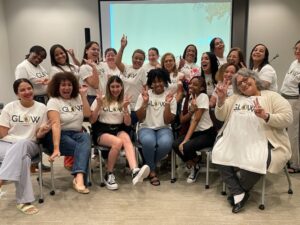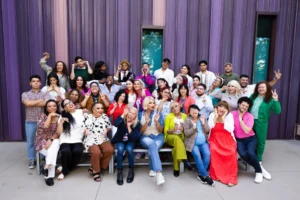
Written by Cora Cartagena
Each September, as we celebrate Latine Heritage Month, I am reminded that our stories, our culture, and our resilience are central to the fight to end the HIV epidemic. As a first-generation Peruvian immigrant and a Program Manager at NMAC, I have seen firsthand that HIV advocacy is not just about science and medicine; it is about people, culture, and justice. It is about creating spaces where all Latine women—cisgender, transgender, queer, bisexual, lesbian, straight, and pansexual—can lead with their full identities.
Through NMAC’s GLOW (Growing Leadership Opportunities for Women) and NextGen Fellowship public health programs, I have witnessed the power of investing in women one at a time. GLOW is a bilingual inclusive program where women come together to learn about HIV prevention, stigma reduction, and community organizing. Our curriculum welcomes women who identify as She and/or They (Ella/Elles) and includes Afro Latinas, undocumented immigrants, women who use substances, formerly incarcerated women, sex workers, and women of trans experience—many identities that are often excluded from mainstream public health programming.

When I think of Latinas leading the HIV movement, I think of Mila Hellfyre, a proud GLOW and NextGen young graduate and mini grant awardee, who used her project to confront HIV stigma and transphobia through storytelling and creating spaces of empowerment for transgender women in rural Puerto Rico. I also think of Lina Rodriguez, a Latine millennial leader in New York who works with Voces Latinas to support recently arrived LGBTQIA+ immigrants, helping them navigate health services and find community. I think of Natalie Sanchez, MPH, Director of UCLA Family AIDS Network, who represents us Latina women in the HIV movement as a council member in the Presidential Advisory Council on HIV/AIDS (PACHA). I also think of Silvia Valerio from TransLatina Coalition and Arianna from Arianna’s Center, two powerful women whose mentorship shapes my own advocacy. Silvia builds safety and leadership pathways for cisgender and transgender Latinas in LA, and Arianna provides HIV services and empowerment for immigrant transgender women from Florida all the way to rural Puerto Rico. They have shown me what it means to lead with meaningful action plans, compassion, and cultural humility—even when we have limited financial resources.
In these spaces, women show up fully, exploring all their identities, sharing their truths, and designing projects that meet their communities where they are. Participants do not just receive information; they create solutions focused on wellness. They design outreach campaigns, host educational events, build social media campaigns to reach women and youth, and facilitate support groups. When women are trusted directly with the tools to lead, they transform their communities.

At this year’s United States Conference on HIV and AIDS, we showcased two workshops featuring short videos of projects from Los Angeles to rural Puerto Rico. These were not hypothetical case studies, but real public health initiatives born from our mini grants program, where participants received training, coaching, and seed funding to make their vision a reality. At a time when government defunding is dismantling HIV prevention and treatment infrastructure, these solutions are not just impactful—they are essential for our survival.
Community investment is not just a strategy; it is our lifeline. When we trust people with the resources to lead, they create solutions that work. Mini grants are a vote of dignity and confidence that says: your voice matters, your idea matters, and your community matters. I have seen these programs make measurable and lasting impact from Alaska and Hawaii to rural Puerto Rico. They must grow to meet the needs of our communities as public funding shrinks.
Biomedical innovation will continue advancing, but breakthroughs mean little if people cannot access or trust them. Funding trusted messengers and local leaders is how science becomes action.
This month, we also cannot ignore the fear many of our undocumented neighbors live with daily. ICE raids and racial discrimination keep too many from seeking lifesaving care. Supporting them means more than preparing workplace safety plans—it means showing up with cultural humility and rebuilding trust where it has been broken.
View this post on Instagram
Above all, we must continue to trust women, immigrants, and youth to lead. We have the blueprint, we have the community, and we have the will. Together, we can end the epidemic with one person, one project, and one community at a time.
This month must remind us that undocumented people are part of every community we serve. There are more than eleven million undocumented immigrants in the United States living in fear, often invisible in our statistics. HIV does not care about immigration status, and neither should our programs.
It will take more than Spanish translations and interpretations to reach these communities. It will take representation, cultural humility, and trust. It will take a Coalition of Equity and Justice—a network that unites women, queer leaders, immigrants, and allies to fight HIV stigma, defend HIV prevention and treatment funding, and demand representation.
View this post on Instagram
I write this not just as an HIV advocate but as an immigrant woman who has seen the difference this investment makes. A single mini grant can transform a local leader’s ability to reach her neighbors with a message of hope and prevention. I have seen so many other Latina women like Mila and Lina find their voices in GLOW and NextGen and create ripples of change far beyond what we could have imagined. The path to ending the HIV epidemic runs through our communities—one woman, one project, and one local effort at a time. Trust and invest in Latina women to end the HIV epidemic. Together, we will make an HIV stigma-free future.
If you are interested in supporting our work, please visit nmac.org or email me at ccartagena@nmac.org.
Cora Trelles Cartagena, MPH
(She/Ella)
Program Manager
GLOW and NextGen Fellowship
Coalition for Equality and Justice Across Movements
Resources:
- NMAC GLOW Program
- USCHA GLOW 2025 Workshop
- NMAC NextGen Program
- USCHA NextGen 2025 Workshop
- NMAC Coalition for Equality and Justice
- TransLatin@ Coalition
- Arianna’s Center
- UCLA Family AIDS Network
- Confessions Podcast
- Voces Latinas
About the Author:
Cora Trelles Cartagena, MPH, serves as the Manager for GLOW (Growing Leadership Opportunities for Women) and NextGen: Emerging Leaders Fellowship, two leadership-building public health programs within NMAC’s Coalition for Justice & Equality Across Movements that invest in women and youth.
GLOW, supported by Gilead Sciences, empowers women—particularly those from marginalized communities—through leadership development, holistic health, and HIV advocacy. NextGen, supported by ViiV Healthcare, equips young leaders with the tools, mentorship, and networks needed to drive the future of HIV advocacy and health equity.
She is a first-generation Peruvian immigrant whose advocacy centers on health equity, language justice, and ensuring all Latine communities are seen and heard. At NMAC, Cora played a key role in launching and scaling bilingual and inclusive initiatives, including facilitating workshops in Spanish (e.g., ESCALATE en Español), and coordinating training for emerging leaders across diverse identities and geographies. Her work bridges grassroots activism, program development, and public health in pursuit of ending the HIV epidemic by centering representation, dignity, and culturally grounded leadership.













